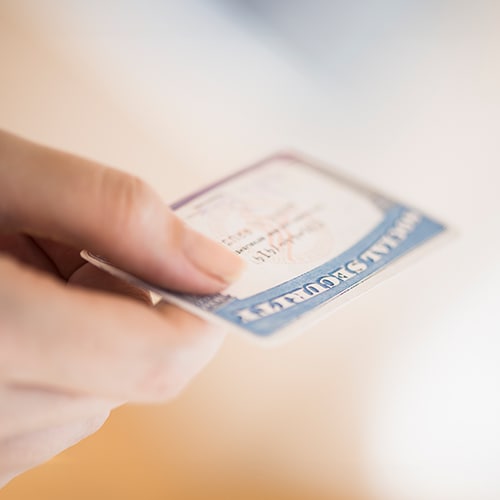Your Social Security number (SSN) is a critical piece of personal information that influences many aspects of your life. If it gets exposed or stolen, the consequences can be severe—you could become a victim of financial fraud, and bogus activity linked to your Social Security number could result in you being denied employment or other opportunities.
And if your SSN has been stolen, either through a scam or hack, your number could be part of a wider data leak, as happened in the enormous NPD data breach that exposed 2.9 billion rows of data including Social Security numbers.
Thankfully, if your SSN is ever stolen, there are steps you can take to help mitigate the fallout. Learn what to do if your SSN has been exposed, leaked, or stolen.
9 steps to take after someone steals your Social Security number
It’s vital that you take swift and robust action to help protect yourself from identity theft if you know, or have reason to believe, that your Social Security number’s been compromised.
Here are the steps to take (more detailed descriptions of how to complete each step follow below):
- Lock your Social Security number to keep it from being accessed or used for employment or benefits.
- Tell the three national credit bureaus your situation so creditors don’t approve loans to someone else using your SSN.
- Check your credit report regularly; it will not affect your credit score.
- File reports with the FTC, IC3, and the police.
- Alert businesses and institutions the identity thief may have dealt with.
- Contact the IRS to make sure the identity thief hasn’t claimed your tax return.
- Close accounts with the businesses that the identity thief gave your SSN to.
- Draft a letter to stop debt collectors from coming after you.
- Think about getting a new Social Security number only as a last resort.
Step 1: Lock your Social Security number
Locking your Social Security number prevents it from being accessed or modified for employment or benefit purposes. You can do this by going to e-verify.gov or by calling the Social Security Administration (SSA) at 800-772-1213.
When you lock your Social Security number, identity thieves won’t be able to apply for jobs or claim income in your name.
To lock your Social Security number for free online, visit the Self Lock page on the U.S. government’s E-Verify website.
You’ll need to choose answers to three security questions. Make sure you’ll be able to answer these questions later to verify your identity when unlocking your SSN again, such as when applying for a new job.
Step 2: Place a fraud alert with the credit bureaus
Placing a fraud alert with the three national credit bureaus—Experian, Equifax, and TransUnion—encourages creditors or lenders to take additional steps to verify that it’s you applying for a new loan or credit card.
For example, if someone applies for a new credit card in your name, the credit card company may call you at the number you provide. You can then verify if you have applied for the card or if someone is trying to fraudulently open an account in your name.
You only need to place an alert with one of the three credit bureaus, and that bureau will contact the other two. Your initial fraud alert will remain attached to your credit file for one year. You have the option to renew the alert after the one-year period ends.
Remember that it’s free to place a fraud alert. Here’s how you can contact the bureaus to place an alert on your credit files and head off Social Security-related identity theft:
| Equifax | Experian | TransUnion |
| Equifax Fraud and Active Duty Alerts | Experian Fraud Alert | TransUnion Fraud Alert |
| 1-888-378-4329 | 1-888-397-3742 | 1-800-680-7289 |
| Equifax Information Services LLC P.O. Box 105069 Atlanta, GA 30348-5069 | ExperianP.O. Box 9554 Allen, TX 75013 | TransUnion Fraud Victim Assistance Department P.O. Box 2000 Chester, PA 19016-2000 |
Another option is to freeze your credit so that no one can take credit out in your name, including you. You can unfreeze your credit whenever you’re ready.
Step 3: Check your credit report and financial accounts
Check your credit report for signs of identity theft, like credit card accounts you never opened or unfamiliar loans. You should also look at the transaction history on your other financial accounts; watch out for large withdrawals and suspicious purchases.
It’s a good idea to check your credit report regularly. Checking your own credit report doesn’t lower your credit score either, unlike hard inquiries when you apply for credit.
Step 4: File reports with the FTC, IC3, and police
When you report identity theft or that your SSN has been stolen to the FTC, IC3, and the police, you may help insulate yourself from fraudulent activities undertaken in your name. You don’t want to be liable for fraudulent debt, and spreading the word about your identity theft can help mitigate damage.
Here’s how to file reports with each of these institutions:
How to report Social Security fraud to the FTC
File a report with the FTC (Federal Trade Commission) as soon as possible. The FTC’s job is to protect consumers and businesses from unfair and unlawful practices. Since identity theft is among the most dire, the FTC positions its fraud report tools front and center.
The FTC will provide you with a recovery plan—a comprehensive checklist of everything you need to do if someone’s stolen your Social Security number. The checklist will guide you through the steps we’ve outlined here.
Identity theft usually takes a long time to resolve, but you can make it shorter by being patient and careful as you begin the recovery process. The FTC will be the most helpful if you’ve done some of the work yourself.
Here’s how to report Social Security theft and fraud to the FTC:
- Go to the FTC’s identity theft portal.
- Click Get Started and answer the questions about your situation.
- Follow the FTC’s personalized recovery plan. If you were the victim of ID theft, they also provide pre-written letters to send to the right parties to dispute damages.
If you’d rather speak to someone on the phone, call 1-877-FTC-HELP (1-877-382-4357).
How to report Social Security fraud to the IC3
The IC3 (Internet Crime Complaint Center) is the FBI’s division for dealing with cybercrime. They review complaints and share information with federal, state, local, or international bodies as appropriate.
Here’s how to file a report with the IC3:
- Go to the IC3’s complaints page and click Other Cyber Crime.
- The IC3 asks you to have the following information ready before you proceed: Your address, email address, phone number, description of the incident, and any additional information requested in the form deemed relevant to your report.
- You will be guided through the remaining steps with on-screen instructions.
How to report Social Security fraud to the police
Reporting Social Security fraud to the police can strengthen your case in certain instances. While the police don’t specialize in identity theft, they have access to information that can increase your chances of finding the culprit who committed fraud.
Here’s what you should do when reporting Social Security fraud to the police:
- Gather materials, like your FTC report, ID, and proof of address.
- File a police report. How to do this will depend on your local police department.
- Keep a copy of your police report.
Step 5: Contact relevant companies and service providers
Contact any legal entity where your Social Security number was used fraudulently to inform them. When identity theft happens, you should also directly alert relevant organizations where the fraudster might try and use your number.
Here are some organizations you might need to contact:
- Banks
- Insurance companies
- Healthcare providers
- Loan lenders
- Utility companies
Step 6: Figure out any tax implications
Contact the IRS and tell them your SSN has been stolen. In one of the most nefarious tax scams, criminals can use your SSN to file and claim your tax return. This can also lead to an audit, adding even more work to your identity theft recovery process.
Step 7: Close fraudulent accounts
Closing fraudulent accounts as soon as possible helps with damage control. Anywhere a new account was opened, request written documentation from that business stating that you aren’t liable for any debt and that the fraudulent account was removed from your credit report.
Step 8: Stop debt collectors from hounding you
You have the right to block contact with debt collectors regarding debts that you don’t owe. The FTC provides a sample letter on page 25 of this recovery guidance document. You’ll need to provide some evidence, like your FTC identity theft report.
Step 9: Consider getting a new Social Security number
Requesting a new Social Security number is a last resort and the Social Security Administration rarely issues new numbers. But it may do so if you experience ongoing ID theft issues or if your personal safety is threatened. But, be aware that having a second SSN can also cause complications and make it challenging to prove your identity in the future.
How to tell if someone is using your SSN
You can tell if someone is using your SSN by watching out for strange activity on your credit reports and being aware of strange letters, calls, or emails. You may also get rejected when applying for credit or jobs.
Look for these signs of identity theft:
- Creditors and debt collectors are calling you. Investigate your accounts and act fast to minimize the damage. Some scammers pose as debt collectors to scam you when actually no identity theft is involved. So, ask for proof. Debt collectors always need proof of the debt in the form of a validation notice.
- You’re getting rejected for loans and credit applications. You’ll get rejected if you have a low credit score, and your credit score can be greatly weakened by the actions of the identity thief.
- You find strange activity in your bank history and credit report. Look for unfamiliar accounts on your credit report and take note of any hard inquiries that you didn’t know about.
- You’re getting fraud alerts… or you aren’t. Banks and credit bureaus will be able to spot fraud, but identity thieves can secretly change the contact information for the fraud alerts so you never get them. If notifications suddenly stop, that too could be a bad sign.
- You receive an unexpected W-2 form. A stolen SSN is usually necessary to carry out employment identity theft. If you receive a W-2 for income you didn’t earn, a fraudster may have successfully used your SSN in a job application.
Don’t wait for the red flags of identity theft to show up. Be proactive in protecting your personal information and identity in the first place.
How to help protect yourself from SSN theft
You can help protect yourself from Social Security number theft by keeping track of your records, being careful when giving out personal information and improving your online security.
Here’s how to help protect your SSN and look out for ID theft:
- Check your credit report regularly. Remember that a self-check is a soft inquiry that doesn’t weaken your credit score.
- Be protective of your SSN. Be suspicious if someone wants your SSN. Ask if an alternative form of ID is accepted and ask why they need the Social Security number specifically.
- Check your Social Security Statement regularly. If you spot errors in your reported earnings the statement explains how to get them corrected.
- Pay attention to junk mail and notices from the IRS. It may be more than just run-of-the-mill scam emails or junk mail. Messages from creditors may be ending up in your spam inbox.
- Maintain good internet security. Always follow Cyber Safety best practices and install a password manager and antivirus to help keep criminals away from your sensitive information.
- Get identity theft protection. Try a reliable identity theft protection service like LifeLock Standard, which goes beyond credit monitoring and what you can do just by yourself. You’ll get alerts† if we find potentially fraudulent use of your Social Security number, name, address, or date of birth in applications for services or credit.
You may think you haven’t done anything risky—but consider how many legal entities have your Social Security number on file. Any one of them could be hit by a data breach, leading to your SSN getting leaked onto the dark web.
SSN scams you need to know about
Scammers will try anything to convince you to share your Social Security number. Here are some common SSN scams:
- Seemingly helpful phone calls offering a record or report of your Social Security payments and a projection of future income if you confirm your SSN.
- Phishing emails that attempt to get you to click a dangerous link in an email or provide your SSN.
- Threatening phone calls that claim your SSN has been linked to criminal activity and that you need to take action to fix it.
Staying mindful of scams is a good way to help prevent identity theft. But you don’t need to do it all alone. Identity theft protection services are there to help protect against identity theft and take care of things should the unexpected happen.
Get award-winning identity theft protection
No matter how careful you are, you can still fall victim to identity theft. Many businesses and institutions have your Social Security number on file, and it only takes one of them to get hit for that information to get out—along with your name and other personal information.
LifeLock Standard offers an array of identity theft protection tools and services, including Social Security number alerts† that monitor for signs of fraudulent use. We’ll also help you if your wallet is stolen, by helping to cancel or replace your Social Security card, credit cards, and more. Get a 30-day free trial to see how LifeLock can be your first line of defense against identity theft.
FAQs about what to do if someone has your SSN
Still got questions related to stolen SSNs? We have answers.
Should I be worried if someone has my Social Security number?
Yes, an exposed Social Security number is a major cause of concern. If a fraudster has your number, and enough other details, they could use it to apply for credit or a job. This could impact your credit score or employment history and stop you from taking out loans, getting a new job, buying a house, and other opportunities.
How do I check to see if someone is using my Social Security number?
Here’s how to check if someone’s using your Social Security number:
- Check your Social Security Statement and watch out for anything unfamiliar.
- Review your credit reports from Equifax, TransUnion, and Experian.
- Check your bank statements for irregularities.
Could someone still use my Social Security number if they have one wrong digit?
Getting one digit wrong means that the identity verification will fail and your SSN won’t be able to be used. However, the last four digits of your SSN are very important as many organizations only request these from your SSN to confirm your identity. If someone has the last four digits of your SSN in addition to other personal information used in the verification process, they may be able to commit fraud.
†LifeLock does not monitor all transactions at all businesses.
Editor’s note: Our articles provide educational information. LifeLock offerings may not cover or protect against every type of crime, fraud, or threat we write about.
This article contains
- 9 steps to take after someone steals your Social Security number
- Step 1: Lock your Social Security number
- Step 2: Place a fraud alert with the credit bureaus
- Step 3: Check your credit report and financial accounts
- Step 4: File reports with the FTC, IC3, and police
- Step 5: Contact relevant companies and service providers
- Step 6: Figure out any tax implications
- Step 7: Close fraudulent accounts
- Step 8: Stop debt collectors from hounding you
- Step 9: Consider getting a new Social Security number
- How to tell if someone is using your SSN
- How to help protect yourself from SSN theft
- SSN scams you need to know about
- Get award-winning identity theft protection
- FAQs about what to do if someone has your SSN
Start your protection,
enroll in minutes.
LifeLock is part of Gen – a global company with a family of trusted brands.
Copyright © 2025 Gen Digital Inc. All rights reserved. Gen trademarks or registered trademarks are property of Gen Digital Inc. or its affiliates. Firefox is a trademark of Mozilla Foundation. Android, Google Chrome, Google Play and the Google Play logo are trademarks of Google, LLC. Mac, iPhone, iPad, Apple and the Apple logo are trademarks of Apple Inc., registered in the U.S. and other countries. App Store is a service mark of Apple Inc. Alexa and all related logos are trademarks of Amazon.com, Inc. or its affiliates. Microsoft and the Window logo are trademarks of Microsoft Corporation in the U.S. and other countries. The Android robot is reproduced or modified from work created and shared by Google and used according to terms described in the Creative Commons 3.0 Attribution License. Other names may be trademarks of their respective owners.






